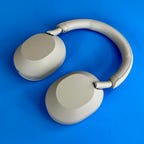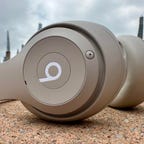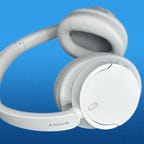
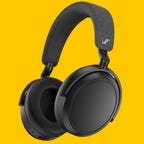
Best Sennheiser noise-canceling headphones
Sennheiser Momentum 4 Wireless
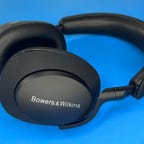
Next-gen Bowers & Wilkins noise-canceling headphones
Bowers & Wilkins PX7 S2
The AirPods Max is one of the best headphones in the market right now. It scored top marks in my review due to its premium design, impressive audio quality and excellent noise-canceling tech. However, not everyone has the budget for it. If you're on a tighter budget, we're happy to inform you that there are plenty of headphone options out there that sound great.
The AirPods Max list for $549 at Apple, and even though you can often find them on sale for less, not everyone wants to drop nearly $500 on a pair of headphones. That's why we've rounded up some of the best AirPods Max alternatives that you can snag for hundreds less. Below are my current top picks, including Apple's own Beats Studio Pro, all of which I've fully reviewed or had hands-on experience with over several weeks.
And for those who want AirPods Max alternatives, price be damned, check out our list of the best high-end Bluetooth headphones and earbuds.
When you have a product that a lot of people love, change can be risky. Such is the case for Sony's WH-1000XM5, the fifth generation of the 1000X series headphones, which were first released in 2016 as the MDR-1000X Wireless and have become increasingly popular as they've improved with each generation.
Over the years, Sony has made some tweaks to the design, but nothing as dramatic as what it's done with the WH-1000XM5. Other than the higher price tag, most of those changes are good, and Sony's made some dramatic improvements with voice-calling performance, as well as even better noise canceling and more refined sound.
Because of all that, the WH-1000XM5 have earned a CNET Editors' Choice Award.
Photo Gallery 1/1
Sennheiser's previous-generation Momentum Wireless headphones have always had a pretty distinct look that was part retro/part modern and stood out for the exposed metal on the headband. For better or worse, that's all gone now, and the new Momentum 4 Wireless, Sennheiser's flagship noise-canceling headphones, look a bit more subdued and also a bit more like some competitors.
The Momentum 4 Wireless offers superior performance over the Momentum 3 Wireless in every regard, though the biggest gains are with noise canceling and voice-calling performance as well as battery life, which is outstanding. It's up to 60 hours at moderate volume levels. There's also a transparency mode that allows ambient sound in and the ability to create a custom sound profile in the Smart Control app for iOS and Android using the built-in EQ. Other features include sound modes and a new Sound Personalization feature that "assesses the user's listening preferences and adjusts the listening experience according to their taste."
Equipped with 42mm drivers, Sennheiser says the Momentum 4 Wireless offer "best-in-class" sound, which is debatable. I'd say the Momentum 4's sound quality is right there with other models in this price range -- they sound excellent, with the requisite well-defined, punchy bass, relatively wide soundstage (they sound pretty open) and smooth treble that brings out some of the finer details in well-recorded tracks. They're a pleasure to listen to.
Love 'em or hate 'em, Beats Studio headphones are among the most popular headphones of all time, launching as a wired headphone back in 2008. This is their fourth generation, and they carry the same list price as their predecessor and look very similar on the outside but have some big changes on the inside that make them significantly better headphones. I'm tempted to describe them as more affordable plastic versions of the AirPods Max. However, that's not quite accurate due to a choice in chipsets and one notable missing feature. But read our full review to find out what makes this a very good headphone -- and good AirPods Max alternative -- with some caveats.
Available in three color options (gray, blue and black), Bowers & Wilkins PX7 S2 headphones offer some significant improvements over the first-generation version. Not only are these headphones more comfortable -- they tip the scales at 307 grams -- but they sound better and have better noise-canceling and voice-calling performance with improved noise reduction. I don't necessarily think they're a better option than the lighter and even more comfortable Sony WH-1000XM5. But the PX7 S2 certainly looks and feels luxurious, with its sturdy design, and delivers very good sound with better voice-calling performance thanks to an upgraded microphone setup.
Bowers & Wilkins has also released a step-up model, the PX8, that features even better sound but costs significantly more.
Sony's improved entry-level noise canceling headphones, the CH-720Ns, have a bit of a plastic-y budget vibe, but they're lightweight and very comfortable. Part of me was expecting them to sound pretty mediocre, but I was pleasantly surprised. No, they don't sound as good as the WH-1000XM5s. But they sound more premium than they look (and feel), and their overall performance is a nice step up from their predecessor, the CH-710Ns.
The QuietComfort 45 has virtually the same design as its predecessor, the QuietComfort QC35 II, which many people considered one of the most comfortable over-ear headphones -- if not the most comfortable. It has the same drivers, according to Bose, and the buttons are in the same place. However, there are small but notable changes. First off, these thankfully have USB-C instead of Micro-USB.
Secondly, the microphone configuration is different. Not only have the mics been shifted on the headphones, but there's now an extra external microphone for voice pick-up, which means the QC45 has a total of six microphones, four of which are beamforming and used for voice. By contrast, the QC35 II has a total of four, two of which are used for voice. (The Bose Noise Canceling Headphones 700 also have six microphones total.)
These headphones are excellent for making calls. They're similar to the Bose Headphones 700 in that regard. They also include top-notch noise canceling and multipoint Bluetooth pairing, so you can connect them with a PC and your phone simultaneously. Read our Bose QuietComfort 45 review.
The AirPods Pro (2nd generation) are powered by Apple's H2 chip, which delivers more processing power while being more energy efficient, according to Apple. The H2 chip, combined with new low-distortion drivers, allows for improved sound that offers better clarity and depth.
The noise canceling is also improved. Apple says the AirPods Pro 2 have "double" the noise canceling of the original AirPods Pro. The new AirPods add an extra hour of battery life, up from five to six hours with noise canceling on. Plus, a speaker in the case that emits a sound that helps locate your buds via Find My should they decide to hide from you.
Bose's second-generation QuietComfort Earbuds 2 are not only about 30% smaller than their predecessors, but their case is about 40% smaller and truly pocketable. They feature best-in-class noise canceling and improved sound, thanks to Bose's new CustomTune sound calibration system that customizes the sound for your ears. Voice-calling performance is also significantly better than that of the original QuietComfort Earbuds.
The other big change is to the ear tips. Bose has ditched its one-piece StayEar wing tips for a two-piece Fit Kit system that features separate ear tips and "stability bands" in three size options, giving you more flexibility to get a secure fit and tight seal.
These changes helped the QuietComfort Earbuds 2 earn a CNET Editors' Choice Award.
If you can't afford Sony's WH-1000XM5 or Bose QC45, the Soundcore by Anker Space Q45 (yes, there's a bit of copying going on here) is a good alternative. While it may not fit some smaller heads, it's comfortable to wear, with nicely padded ear cups and a dual-hinge folding design. Sound quality is very good and the headphones offer better noise canceling than the step-down Q35, as well as multipoint Bluetooth pairing (these are equipped with Bluetooth 5.3) and support for the LDAC audio codec for streaming high-resolution music tracks over Bluetooth, if you have a device that supports LDAC. Many Android phones do, although Samsung's Galaxy phones don't.
Battery life is very good at up to 50 hours with noise canceling on at moderate volume levels and the headphones come with a hard carrying case for travel.









 Add Category
Add Category